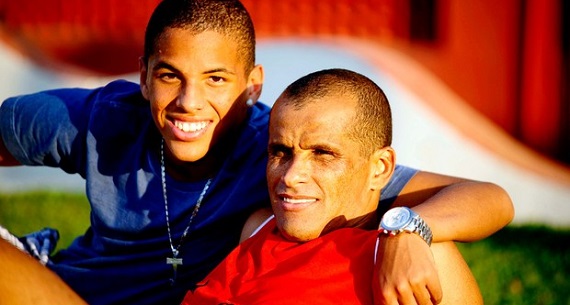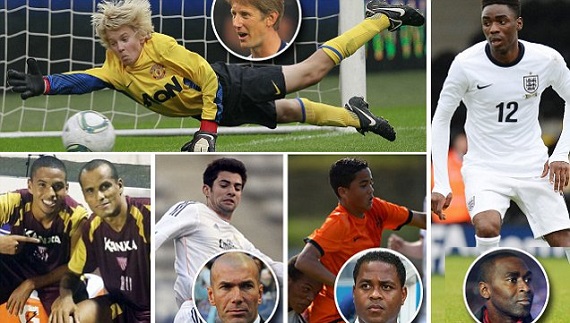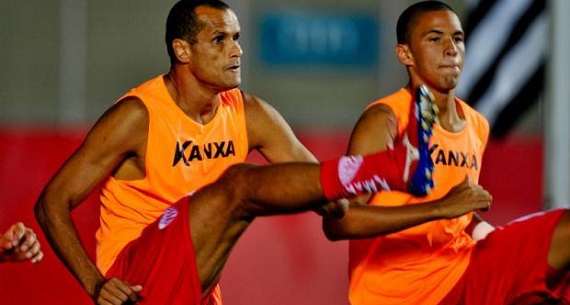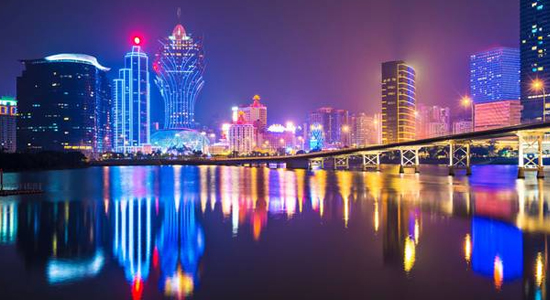Rivaldo and Son Rivaldinho Score in the Same Match
Rivaldo and son, 20-year-old Rivaldinho played together for Mogi Mirim last year. That is the club where Rivaldo jump-started his career in the early nineties.
And that is the club where he became club president in 2008. He also returned as a player twice for them. However he decided to finish his playing career recently. But it was tough for him, as Mogi Mirim struggled.
After a while Rivaldo returned to the team that was on the bottom of the Brazilian Serie B table. Since then, they are unbeaten in two games. Moreover, Rivaldo and son both scored against Macae most recently. The World Cup winner contributed to all of his team’s three goals. He scored one himself and his son bagged a brace. Some sort of football history was written there.
The Guardian: Former Brazil star Rivaldo and his son both score in same league match
Mogi Mirim club president Rivaldo and son, Rivaldinho both play for the Brazilian Serie B outfit. Against Macae both of them got on the scoresheet in a 3-1 victory, as keen followers of live sports results might know.
Rivaldo, who is 43-year-old, retired before. However he has reactivated himself to help his struggling team. Mogi Mirim are unbeaten since Rivaldo’s return two games ago. They also moved from the bottom of the table, gambling news report.
The World Cup winner was playing for Barcelona at the peak of his career. Now he spent 50 minutes on the pitch to get involved in all three of his team’s goals. He contributed to his son’s diving header with a key pass in the build-up as early as the third minute.
Rivaldo and son, Rivaldinho then scored two more. The former world class player found the net from the spot in the 17th minute. Then Rivaldinho converted a one-on-one towards half-time. A late Macae comfort came from Pipico in the 81st minute then. Rivaldo said after the match that he was “grateful and happy”.
BBC.com: Rivaldo: World Cup winner and son score in same Brazilian match
A Brazilian second-tier game saw Rivaldo and son, Rivaldinho scoring both. Like fathers, like sons. The World Cup winner contributed to all of Mogi Mirim’s goals. Rivaldo is also club president there. He decided to come out from a short retirement recently to help his team.
Rivaldo set up the assist before his son’s header with a key pass in the third minute. Then he scored from a penalty, before his son registered the third. Many of those who follow sports scores might remember famous father and son moments. There was Briand and Nigel Clough, Cesare and Paolo Maldini, but none of them played together.
The 17-year-old Eidur Gudjohnsen replaced his father, Arnor, 34 then, in an Iceland international game in 1996. They weren’t together on the pitch though like Rivaldo and son. Ian Bowyer and his son, Gary represented Hereford United together in the 1989-1990 season. The same goes for Alec Herd and his son, David, who played together for Stockport County in the 1950s.
ESPNFC.com: Rivaldo and son Rivaldinho keep it in the family in Brazil second division
The Rivaldo moment that many gambling blog readers recall first, would be his overhead kick for Barcelona. Then maybe his brace against Denmark at the FIFA 1998 World Cup. Only until the Mogi Mirim match, where Rivaldo and son, Rivaldinho scored both in the Brazilian Serie B.
Rivaldo played for Mogi Mirim in the early nineties, before making himself a name in Europe. Now he is trying to help them as club president, and after a short retirement, once again as a player. Rivaldo and son already played together last year for Mogi Mirim. However this is the first time that both of them scored.
At the peak of his career, Rivaldo was elected World Player of the Year. Now he is 43, and acting as Mogi Mirim president since 2008. He was an active player until 2014, but then he opted to retire. However that was cut short. He couldn’t watch his team struggling from the terraces. He came back to play and Rivaldo and son wrote history together.

Rivaldo and son, 20-year-old Rivaldinho played together for Mogi Mirim last year. That is the club where Rivaldo jump-started his career in the early nineties.
And that is the club where he became club president in 2008. He also returned as a player twice for them. However he decided to finish his playing career recently. But it was tough for him, as Mogi Mirim struggled.
After a while Rivaldo returned to the team that was on the bottom of the Brazilian Serie B table. Since then, they are unbeaten in two games. Moreover, Rivaldo and son both scored against Macae most recently. The World Cup winner contributed to all of his team’s three goals. He scored one himself and his son bagged a brace. Some sort of football history was written there.
The Guardian: Former Brazil star Rivaldo and his son both score in same league match
Mogi Mirim club president Rivaldo and son, Rivaldinho both play for the Brazilian Serie B outfit. Against Macae both of them got on the scoresheet in a 3-1 victory, as keen followers of live sports results might know.
Rivaldo, who is 43-year-old, retired before. However he has reactivated himself to help his struggling team. Mogi Mirim are unbeaten since Rivaldo’s return two games ago. They also moved from the bottom of the table, gambling news report.
The World Cup winner was playing for Barcelona at the peak of his career. Now he spent 50 minutes on the pitch to get involved in all three of his team’s goals. He contributed to his son’s diving header with a key pass in the build-up as early as the third minute.
Rivaldo and son, Rivaldinho then scored two more. The former world class player found the net from the spot in the 17th minute. Then Rivaldinho converted a one-on-one towards half-time. A late Macae comfort came from Pipico in the 81st minute then. Rivaldo said after the match that he was “grateful and happy”.
BBC.com: Rivaldo: World Cup winner and son score in same Brazilian match
A Brazilian second-tier game saw Rivaldo and son, Rivaldinho scoring both. Like fathers, like sons. The World Cup winner contributed to all of Mogi Mirim’s goals. Rivaldo is also club president there. He decided to come out from a short retirement recently to help his team.
Rivaldo set up the assist before his son’s header with a key pass in the third minute. Then he scored from a penalty, before his son registered the third. Many of those who follow sports scores might remember famous father and son moments. There was Briand and Nigel Clough, Cesare and Paolo Maldini, but none of them played together.
The 17-year-old Eidur Gudjohnsen replaced his father, Arnor, 34 then, in an Iceland international game in 1996. They weren’t together on the pitch though like Rivaldo and son. Ian Bowyer and his son, Gary represented Hereford United together in the 1989-1990 season. The same goes for Alec Herd and his son, David, who played together for Stockport County in the 1950s.
ESPNFC.com: Rivaldo and son Rivaldinho keep it in the family in Brazil second division
The Rivaldo moment that many gambling blog readers recall first, would be his overhead kick for Barcelona. Then maybe his brace against Denmark at the FIFA 1998 World Cup. Only until the Mogi Mirim match, where Rivaldo and son, Rivaldinho scored both in the Brazilian Serie B.
Rivaldo played for Mogi Mirim in the early nineties, before making himself a name in Europe. Now he is trying to help them as club president, and after a short retirement, once again as a player. Rivaldo and son already played together last year for Mogi Mirim. However this is the first time that both of them scored.
At the peak of his career, Rivaldo was elected World Player of the Year. Now he is 43, and acting as Mogi Mirim president since 2008. He was an active player until 2014, but then he opted to retire. However that was cut short. He couldn’t watch his team struggling from the terraces. He came back to play and Rivaldo and son wrote history together.

Macau Reports Most Painful Revenue Drop Since 2005
Macau has had a few rough months during and after the World Cup in Brazil, but its streak of bad luck reached its peak in October.
When June reports showed a 3.7% year-on-year drop, industry experts blamed it on the World Cup sports betting craze and said things would pick up. Then revenues came in at just $3.6 billion in July, showing a 3.6% drop from the same period last year and they said Macau needs a bit more time to get back on track.
But as Chinese authorities continue their crackdown on casino corruption, an initiative which scared away a number of VIP customers, things have gotten serious. In October, total casino revenue fell by 23.2% in October compared to the same month of 2013.
The city’s gaming authority said total revenue was at 28 billion Macau patacas ($3.5 billion) this October, marking Macau’s worst financial performance since the gambling hub started recording such data in 2005.
Despite its recent downward trend, Macau continues to be the world’s largest gambling centre, way ahead of Las Vegas. The bad news is that the region relies heavily on casino revenue –mostly on the money spent by high-rollers – which seems to be on the decline. Moreover, it’s the only area where China allows casinos, a type of entertainment otherwise forbidden under the country’s gambling laws.
Reuters: Macau Oct gaming revenues fall 23 pct, drop worst on record
October was the worst month for Macau’s casinos and the fifth consecutive month of declines. Industry representatives blame it on China’s passive war on corruption, as well as on a decline in the number of tourists and a general slowing of economic growth, which makes people spend less on gambling.
“It is worse in October than it was before October,” Steve Wynn, chief executive of Wynn Macau, told a recent earnings call. “I don’t know if it is a squall or if we are in the rainy season, or how long it will last, but we are still very bullish on Macau.”
The American casino developer has started construction on another Macau project – a $4 billion integrated resort, which includes a lake and air-conditioned gondolas.
According to online gambling news, about 80% of Macau’s revenues rely on gambling, but China’s two-year anti-corruption battle has taken its toll on the local casino industry. Big spenders are now avoiding the area and choosing other destinations where they can freely spend their money. Profits from VIP customers accounted for just 56% of total revenues in the third quarter, which was a new low for Macau.
Las Vegas Sands chief Sheldon Adelson said these trends are cyclical. “It is only a matter of time before the cycle reverses itself. No one has ever suggested that the behavior of Chinese and Asian people, which has been established over a 3,000-year history, is going to change.”
Wall Street Journal: Macau Gambling-Revenue Drop Divides Investors
Making smart investments in casino stocks used to be pretty simple. Investors would just choose those companies that had bigger exposure in Macau, knowing that those were the names with the best prospects. Things have changed now that Macau has had its fifth straight month of revenue declines.
Hong Kong-based Central Asset Investments portfolio manager Armand Yeung said: “We were short. Now we’re just staying away from it.” Though valuations have become more reasonable and dividend yields are attractive, “there’s still a lot of debate”, he added.
When an analyst casino magnate Steve Wynn if he thought things were getting worse in Macau, he replied: “Oh, well, that’s an easy question. It’s worse in October than it was before October. So if you’re asking what is the nadir of our experience, it is current.”
Wynn added that Beijing’s efforts to combat corruption in Macau “has put a lot of the wealthy businessmen in the fox holes.”
Credit analysts are expressing concerns about Macau expansion plans, claiming that casinos will not be able to repay their debts if the slowdown in revenue continues.
Forbes: Macau Casino Revenue Falls, VIPs Blamed, Investors Rejoice
Figures released by the Gaming Inspection and Coordination Bureau showed a 3.7% decline in year-on-year revenue in June, with profits dropping to 27.2 billion Macau patacas or $3.4 billion. Industry representatives claim it was caused by a 20% drop in VIP attendance.
This was the first time when Macau’s monthly revenue fell since June 2009, which marked a low point for the city’s casino sector. Union Gaming Research Macau analysts Grant Govertsen and Felicity Chiang pointed out that from the decline in 2009, “Macau went on an unprecedented run [with] tripling of GGR from approximately US$15 billion in 2009 to US$45 billion in 2013.”
Between 2008 and 2009, Macau’s problem was mainly a matter of politics, with an overlay of economic factors. It could be the same this time around, as the 20% drop in VIP revenue is believed to be caused by President Xi Jinping’s anti-corruption campaign in China.
On the other hand, a report released by Morgan Stanley Asia in June cited economic factors from the mainland, while others blamed it on the World Cup, which Union Gaming conceded “could be responsible for a few hundred basis points of the VIP decline.”
Macau has had a few rough months during and after the World Cup in Brazil, but its streak of bad luck reached its peak in October.
When June reports showed a 3.7% year-on-year drop, industry experts blamed it on the World Cup sports betting craze and said things would pick up. Then revenues came in at just $3.6 billion in July, showing a 3.6% drop from the same period last year and they said Macau needs a bit more time to get back on track.
But as Chinese authorities continue their crackdown on casino corruption, an initiative which scared away a number of VIP customers, things have gotten serious. In October, total casino revenue fell by 23.2% in October compared to the same month of 2013.
The city’s gaming authority said total revenue was at 28 billion Macau patacas ($3.5 billion) this October, marking Macau’s worst financial performance since the gambling hub started recording such data in 2005.
Despite its recent downward trend, Macau continues to be the world’s largest gambling centre, way ahead of Las Vegas. The bad news is that the region relies heavily on casino revenue –mostly on the money spent by high-rollers – which seems to be on the decline. Moreover, it’s the only area where China allows casinos, a type of entertainment otherwise forbidden under the country’s gambling laws.
Reuters: Macau Oct gaming revenues fall 23 pct, drop worst on record
October was the worst month for Macau’s casinos and the fifth consecutive month of declines. Industry representatives blame it on China’s passive war on corruption, as well as on a decline in the number of tourists and a general slowing of economic growth, which makes people spend less on gambling.
“It is worse in October than it was before October,” Steve Wynn, chief executive of Wynn Macau, told a recent earnings call. “I don’t know if it is a squall or if we are in the rainy season, or how long it will last, but we are still very bullish on Macau.”
The American casino developer has started construction on another Macau project – a $4 billion integrated resort, which includes a lake and air-conditioned gondolas.
According to online gambling news, about 80% of Macau’s revenues rely on gambling, but China’s two-year anti-corruption battle has taken its toll on the local casino industry. Big spenders are now avoiding the area and choosing other destinations where they can freely spend their money. Profits from VIP customers accounted for just 56% of total revenues in the third quarter, which was a new low for Macau.
Las Vegas Sands chief Sheldon Adelson said these trends are cyclical. “It is only a matter of time before the cycle reverses itself. No one has ever suggested that the behavior of Chinese and Asian people, which has been established over a 3,000-year history, is going to change.”
Wall Street Journal: Macau Gambling-Revenue Drop Divides Investors
Making smart investments in casino stocks used to be pretty simple. Investors would just choose those companies that had bigger exposure in Macau, knowing that those were the names with the best prospects. Things have changed now that Macau has had its fifth straight month of revenue declines.
Hong Kong-based Central Asset Investments portfolio manager Armand Yeung said: “We were short. Now we’re just staying away from it.” Though valuations have become more reasonable and dividend yields are attractive, “there’s still a lot of debate”, he added.
When an analyst casino magnate Steve Wynn if he thought things were getting worse in Macau, he replied: “Oh, well, that’s an easy question. It’s worse in October than it was before October. So if you’re asking what is the nadir of our experience, it is current.”
Wynn added that Beijing’s efforts to combat corruption in Macau “has put a lot of the wealthy businessmen in the fox holes.”
Credit analysts are expressing concerns about Macau expansion plans, claiming that casinos will not be able to repay their debts if the slowdown in revenue continues.
Forbes: Macau Casino Revenue Falls, VIPs Blamed, Investors Rejoice
Figures released by the Gaming Inspection and Coordination Bureau showed a 3.7% decline in year-on-year revenue in June, with profits dropping to 27.2 billion Macau patacas or $3.4 billion. Industry representatives claim it was caused by a 20% drop in VIP attendance.
This was the first time when Macau’s monthly revenue fell since June 2009, which marked a low point for the city’s casino sector. Union Gaming Research Macau analysts Grant Govertsen and Felicity Chiang pointed out that from the decline in 2009, “Macau went on an unprecedented run [with] tripling of GGR from approximately US$15 billion in 2009 to US$45 billion in 2013.”
Between 2008 and 2009, Macau’s problem was mainly a matter of politics, with an overlay of economic factors. It could be the same this time around, as the 20% drop in VIP revenue is believed to be caused by President Xi Jinping’s anti-corruption campaign in China.
On the other hand, a report released by Morgan Stanley Asia in June cited economic factors from the mainland, while others blamed it on the World Cup, which Union Gaming conceded “could be responsible for a few hundred basis points of the VIP decline.”
World Cup Matches Boost Chinese Lottery Results
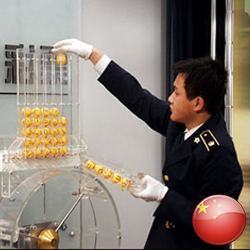
Without fancy marketing campaigns or gambling bonuses, the national lottery manages to be a huge success in China. Over the past few years, the lottery market – especially the sports lottery – has been experiencing a steady growth.Today, the industry is worth more than $480 billion and now experts say its value could increase even more as players will rush to place bets on the 2014 FIFA World Cup. The sports betting market is already a very lucrative one, but the major football event could boost profits by $13.5 billion to $16.2 billion, analysts say.
Want China Times: World Cup boosts China’s already blooming sports lottery
Most popular forms of gambling are forbidden in China, but the national lottery made its debut in 2009 to allow local players to bet on football and basketball sports scores. Since then, football has proved to be especially popular and profitable. The fact that the Chinese lottery offers both better chances of winning and bigger prizes helped business flourish.
In 2010, during the World Cup in South Africa, the football prediction lottery alone sold $10 billion, marking a growth of 120% compared to the same period in 2009. In fact, this amount came very close to the total lottery sales made in 2009.
The lottery industry makes more than $480 billion. Most of it comes from brick-and-mortar businesses, but the internet sports lottery also contributes with an impressive $67 billion, with 14 billion coming from mobile platforms. According to Su Guojing, who founded Chin Sports Lottery, such periodic sports events boost sales by about 25%-30%.
Inside World Football: World Cup gives China Sports Lottery a big boost
China’s blooming sports lottery is expecting further growth over the coming month, due to the World Cup which could increase revenues by $13.5 billion to $16.2 billion. The country offers few options for gamblers, but sports betting is very popular among locals. Betting on Chinese lottery results is also profitable for players, as both their chances of winning and the prizes offered are higher than usual.
In 2013, sales reached an impressive $494 billion, with $67 billion of all wagers being placed over the internet and via mobile devices. Su Guojing, founder of China Sports Lottery, believes this year’s World Cup could boost lottery ticket sales by 25% to 30%.
The Ministry of Finance, which oversees the legal lottery business, has recently reported a 12.6% increase in lottery sales in May. The welfare lottery made 16.2% more sales over the last month, while sports lottery sales went up 8.2%. The first five months of 2014 brought a 13.9% increase in sales. The online lottery industry is also on the rise, with sales going up nearly 63%.
People Daily: Chinese lotteries to score during World Cup
The sports lottery sector is in for a big sales surge around the 2014 FIFA World Cup. During the 2010 soccer event, lottery sales in China hit four billion yuan ($648 million), increasing by 500% year-on-year and 400% compared to the previous month.
Records show more than 600 million Chinese residents now have access to the Internet. The online lottery business has flourished over the past few years and revenues keep going up, especially during major sports events.
An executive of 500, the New York-listed Chinese lottery service provider, told reporters: “We estimate that the World Cup will boost our sales of Internet-based sports lotteries by at least 70 percent.”
Huatai Securities is even more optimistic, predicting an increase of 150% in online sports lottery sales of sports lotteries.
Investors are becoming interested in the growing Chinese lottery market and companies are now seeking niches – including physical stores, online service and mobile Internet service – to help increase their profits.
Big companies are looking to improve their marketing strategies to attract more players and 500 is even offering a jackpot of 100 million yuan for players who successfully predict the results of all 63 World Cup matches.
China Daily: World Cup boosts Chinese sports lottery sales
According to the China Sports Lottery Administration Center, this year’s edition of the World Cup has helped boost the national sports lottery sales. Daily sales have gone up from less than 100 million yuan to more than 400 million yuan since the event started on June 12.
Local gambling news report China’s leading online lottery agent 500 is making roughly three to five times more sales than the daily average. However, it is common for profits to increase during important international sports events.
Official data shows total lottery sales, including welfare and sports, are up by 18.3% on a year-to-year basis, coming close to 310 billion yuan in 2013. Sales made online reached 42 billion yuan last year, accounting for 13.58% of the total amount.

Without fancy marketing campaigns or gambling bonuses, the national lottery manages to be a huge success in China. Over the past few years, the lottery market – especially the sports lottery – has been experiencing a steady growth.Today, the industry is worth more than $480 billion and now experts say its value could increase even more as players will rush to place bets on the 2014 FIFA World Cup. The sports betting market is already a very lucrative one, but the major football event could boost profits by $13.5 billion to $16.2 billion, analysts say.
Want China Times: World Cup boosts China’s already blooming sports lottery
Most popular forms of gambling are forbidden in China, but the national lottery made its debut in 2009 to allow local players to bet on football and basketball sports scores. Since then, football has proved to be especially popular and profitable. The fact that the Chinese lottery offers both better chances of winning and bigger prizes helped business flourish.
In 2010, during the World Cup in South Africa, the football prediction lottery alone sold $10 billion, marking a growth of 120% compared to the same period in 2009. In fact, this amount came very close to the total lottery sales made in 2009.
The lottery industry makes more than $480 billion. Most of it comes from brick-and-mortar businesses, but the internet sports lottery also contributes with an impressive $67 billion, with 14 billion coming from mobile platforms. According to Su Guojing, who founded Chin Sports Lottery, such periodic sports events boost sales by about 25%-30%.
Inside World Football: World Cup gives China Sports Lottery a big boost
China’s blooming sports lottery is expecting further growth over the coming month, due to the World Cup which could increase revenues by $13.5 billion to $16.2 billion. The country offers few options for gamblers, but sports betting is very popular among locals. Betting on Chinese lottery results is also profitable for players, as both their chances of winning and the prizes offered are higher than usual.
In 2013, sales reached an impressive $494 billion, with $67 billion of all wagers being placed over the internet and via mobile devices. Su Guojing, founder of China Sports Lottery, believes this year’s World Cup could boost lottery ticket sales by 25% to 30%.
The Ministry of Finance, which oversees the legal lottery business, has recently reported a 12.6% increase in lottery sales in May. The welfare lottery made 16.2% more sales over the last month, while sports lottery sales went up 8.2%. The first five months of 2014 brought a 13.9% increase in sales. The online lottery industry is also on the rise, with sales going up nearly 63%.
People Daily: Chinese lotteries to score during World Cup
The sports lottery sector is in for a big sales surge around the 2014 FIFA World Cup. During the 2010 soccer event, lottery sales in China hit four billion yuan ($648 million), increasing by 500% year-on-year and 400% compared to the previous month.
Records show more than 600 million Chinese residents now have access to the Internet. The online lottery business has flourished over the past few years and revenues keep going up, especially during major sports events.
An executive of 500, the New York-listed Chinese lottery service provider, told reporters: “We estimate that the World Cup will boost our sales of Internet-based sports lotteries by at least 70 percent.”
Huatai Securities is even more optimistic, predicting an increase of 150% in online sports lottery sales of sports lotteries.
Investors are becoming interested in the growing Chinese lottery market and companies are now seeking niches – including physical stores, online service and mobile Internet service – to help increase their profits.
Big companies are looking to improve their marketing strategies to attract more players and 500 is even offering a jackpot of 100 million yuan for players who successfully predict the results of all 63 World Cup matches.
China Daily: World Cup boosts Chinese sports lottery sales
According to the China Sports Lottery Administration Center, this year’s edition of the World Cup has helped boost the national sports lottery sales. Daily sales have gone up from less than 100 million yuan to more than 400 million yuan since the event started on June 12.
Local gambling news report China’s leading online lottery agent 500 is making roughly three to five times more sales than the daily average. However, it is common for profits to increase during important international sports events.
Official data shows total lottery sales, including welfare and sports, are up by 18.3% on a year-to-year basis, coming close to 310 billion yuan in 2013. Sales made online reached 42 billion yuan last year, accounting for 13.58% of the total amount.
How Do You Say “World Cup” in Your Language? Here are 32 Examples
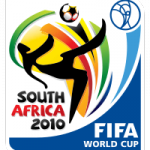 Afrikaans: Wêreldbeker
Afrikaans: WêreldbekerArabic: كأس العالم
Bulgarian: Световно първенство
Catalan: Copa del Món
Chinese: 世界杯
Czech: Světový pohár
Danish: Verdensmesterskab
Dutch: Wereldkampioenschap voetbal
Finnish: Maailmancup
Flemish: Weireldkampioenschap sjotten
French: Coupe du Monde
German: Weltmeisterschaft
Greek: Παγκόσμιο Κύπελλο
Hebrew: גביע העולם
Hindi: विश्व कप
Hungarian: Világ Kupa
Icelandic: Heimsmeistarakeppnin
Indonesian: Piala Dunia
Italian: Coppa del Mondo Il Mondiale
Japanese: W杯
Korean: 세계 축구
Lithuanian: Pasaulio čempionatas
Macedonian: Светско првенство
Malay: Piala Dunia
Maltese: Tazza tad-Dinja
Persian: جام جهانی
Portuguese: Copa do Mundo
Romanian: Cupa Mondială
Russian: Кубок мира
Serbian: Светско првенство
Slovakian: Svetový pohár
Slovenian: Svetovni pokal
Spanish: Copa do Mundo La Copa Mundial
Swedish: Världscupen
Thai: ฟุตบอลโลก
Turkish: Dünya Kupası
Ukrainian: Кубок світу
Vietnamese: Cúp bóng đá thế giới
Drop us a comment for any corrections or additions
Check out World Cup Odds
 Afrikaans: Wêreldbeker
Afrikaans: WêreldbekerArabic: كأس العالم
Bulgarian: Световно първенство
Catalan: Copa del Món
Chinese: 世界杯
Czech: Světový pohár
Danish: Verdensmesterskab
Dutch: Wereldkampioenschap voetbal
Finnish: Maailmancup
Flemish: Weireldkampioenschap sjotten
French: Coupe du Monde
German: Weltmeisterschaft
Greek: Παγκόσμιο Κύπελλο
Hebrew: גביע העולם
Hindi: विश्व कप
Hungarian: Világ Kupa
Icelandic: Heimsmeistarakeppnin
Indonesian: Piala Dunia
Italian: Coppa del Mondo Il Mondiale
Japanese: W杯
Korean: 세계 축구
Lithuanian: Pasaulio čempionatas
Macedonian: Светско првенство
Malay: Piala Dunia
Maltese: Tazza tad-Dinja
Persian: جام جهانی
Portuguese: Copa do Mundo
Romanian: Cupa Mondială
Russian: Кубок мира
Serbian: Светско првенство
Slovakian: Svetový pohár
Slovenian: Svetovni pokal
Spanish: Copa do Mundo La Copa Mundial
Swedish: Världscupen
Thai: ฟุตบอลโลก
Turkish: Dünya Kupası
Ukrainian: Кубок світу
Vietnamese: Cúp bóng đá thế giới
Drop us a comment for any corrections or additions
Check out World Cup Odds
UEFA’s probe into match-fixing scandal reaches Hungary and Switzerland
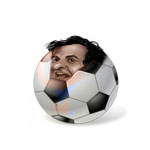
The bitter fruit of soccer governing body UEFA’s labor is blooming in a Europe-wide probe across 12 countries to determine to what extent matches are being fixed for gambling purposes. It appears impossible to say whether UEFA’s efforts will or even can succeed before the 2010 World Cup kicks off in South Africa on June 11.
Sydney Morning Herald: Nine Swiss footballers suspended
Switzerland’s national soccer association has suspended nine players, including five for an indefinite period, for match-fixing as part of the Europe-wide UEFA probe.
The national league board said in a statement that “The Swiss Football Association is, according to current information, the first and only federation which has treated in the consequent manner the suspects of match-fixing made public in autumn 2009.”
None of the nine players suspended were in the top division of Switzerland football. The four players given sentences were banned from Swiss soccer for between 12 and 36 months.
The suspensions were the result of 50 raids in November in Austria, Britain, Germany and Switzerland in the probe’s first big move. In these 50 actions, over €1 million was seized. UEFA official stated that “Without doubt this is the biggest scam there has ever been in European football.”
Sports Illustrated: UEFA quizzes players at Hungarian champion Debrecen over suspected match-fixing
UEFA officials recently questioned eight players of Hungarian league champion Debrecen, which lost all six of its Champions League matches to Fiorentina, Liverpool and Lyon in the 2009-10 season, for which the club earned €9.2 million.
Though UEFA offered no comment as to the extent or subject matter of the discussion, Debrecen official Csaba Bartha did not make much of it, writing on the official club website that “the degree of seriousness of the matter is reflected by the fact that they didn’t even [transcribe] the statements.”
Debrecen is the second Hungarian club to come into question in this particular investigation, after UEFA looked into a suspicious Honvéd loss in November. More than 200 games are being considered for the possibility of match fixing in the UEFA investigation.
USA Today: World Cup arrives amid global match-fixing probes
Referees in Bosnia and Ukraine have been banned for life as part of a UEFA probe in a season when fixing matches has “spread more widely through football than ever.” UEFA President Michel Platini described the situation as seriously enough to put the sport itself in “mortal danger.”
Another threat to the integrity of soccer has arisen aside from the existing match-fixing problems has appeared as well. English Football Association chairman David Triesman stated that Russian criminal elements would be attempting to bribe referees to favor Spain in exchange for Spain’s support of the Russian bid to host the 2018 World Cup.
To prevent scandal from tainting the 2010 World Cup, FIFA officials created the company Early Warning, which would monitor any suspicious activity online concerning match outcomes. The World Cup is expected to generate about $3.4 billion for FIFA.
China is also taking on corruption in soccer at home, arresting among others Chinese Football Federation head Nan York and former World Cup referee Lu Jun.
The UEFA probe first began last year, when a “nest of corruption” was revealed to have involved matches in four World Cup nations (Germany, Greece, Slovenia, Switzerland) and six others (Austria, Belgium, Bosnia, Croatia, Hungary and Turkey).


The bitter fruit of soccer governing body UEFA’s labor is blooming in a Europe-wide probe across 12 countries to determine to what extent matches are being fixed for gambling purposes. It appears impossible to say whether UEFA’s efforts will or even can succeed before the 2010 World Cup kicks off in South Africa on June 11.
Sydney Morning Herald: Nine Swiss footballers suspended
Switzerland’s national soccer association has suspended nine players, including five for an indefinite period, for match-fixing as part of the Europe-wide UEFA probe.
The national league board said in a statement that “The Swiss Football Association is, according to current information, the first and only federation which has treated in the consequent manner the suspects of match-fixing made public in autumn 2009.”
None of the nine players suspended were in the top division of Switzerland football. The four players given sentences were banned from Swiss soccer for between 12 and 36 months.
The suspensions were the result of 50 raids in November in Austria, Britain, Germany and Switzerland in the probe’s first big move. In these 50 actions, over €1 million was seized. UEFA official stated that “Without doubt this is the biggest scam there has ever been in European football.”
Sports Illustrated: UEFA quizzes players at Hungarian champion Debrecen over suspected match-fixing
UEFA officials recently questioned eight players of Hungarian league champion Debrecen, which lost all six of its Champions League matches to Fiorentina, Liverpool and Lyon in the 2009-10 season, for which the club earned €9.2 million.
Though UEFA offered no comment as to the extent or subject matter of the discussion, Debrecen official Csaba Bartha did not make much of it, writing on the official club website that “the degree of seriousness of the matter is reflected by the fact that they didn’t even [transcribe] the statements.”
Debrecen is the second Hungarian club to come into question in this particular investigation, after UEFA looked into a suspicious Honvéd loss in November. More than 200 games are being considered for the possibility of match fixing in the UEFA investigation.
USA Today: World Cup arrives amid global match-fixing probes
Referees in Bosnia and Ukraine have been banned for life as part of a UEFA probe in a season when fixing matches has “spread more widely through football than ever.” UEFA President Michel Platini described the situation as seriously enough to put the sport itself in “mortal danger.”
Another threat to the integrity of soccer has arisen aside from the existing match-fixing problems has appeared as well. English Football Association chairman David Triesman stated that Russian criminal elements would be attempting to bribe referees to favor Spain in exchange for Spain’s support of the Russian bid to host the 2018 World Cup.
To prevent scandal from tainting the 2010 World Cup, FIFA officials created the company Early Warning, which would monitor any suspicious activity online concerning match outcomes. The World Cup is expected to generate about $3.4 billion for FIFA.
China is also taking on corruption in soccer at home, arresting among others Chinese Football Federation head Nan York and former World Cup referee Lu Jun.
The UEFA probe first began last year, when a “nest of corruption” was revealed to have involved matches in four World Cup nations (Germany, Greece, Slovenia, Switzerland) and six others (Austria, Belgium, Bosnia, Croatia, Hungary and Turkey).



